Looking for a more sustainable watch? We have you covered with our top picks for the best solar watches.
Table of Contents
Watch manufacturing is a troubled industry, but some companies are stepping up and trying to do better by people and the planet. Many of these companies still produce watches powered by replaceable batteries, while others have embraced solar power, kinetic energy, and good old-fashioned mechanical winding. We offer a round-up of the best eco-friendly watch companies and some tips on what to look for when choosing a more sustainable watch.
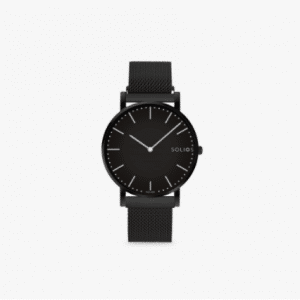
Our top pick for a solar watch
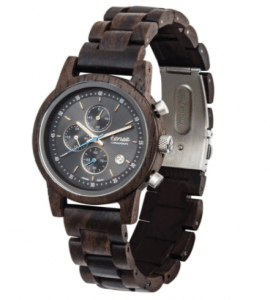
Runner up
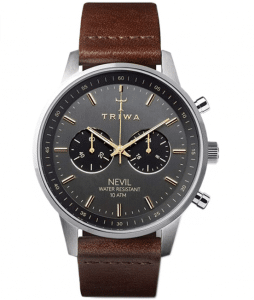
Third pick
How to choose an eco-friendly watch
To choose a truly eco-friendly watch, here are six things to consider:
- The materials used – precious metals, plastics, natural materials, recycled and recyclable materials, conflict-free minerals
- Energy source – mechanical, battery, kinetic, or solar
- Working conditions for the watchmakers – zero child labor, workers paid a living wage and treated with respect
- Packaging – natural materials, minimal packaging, recyclable and recycled
- Company operations – zero waste factories and practices, energy efficient facilities, etc.
- Takeback programs and repair options – lifetime guarantees and free repairs, for instance.
A few certifications to look for when choosing a sustainable solar powered watch include Benefit Corporation (B Corp) status, SA 8000 Certified (for fair working practices), FSC certification (for packaging and any wooden components), and REACH and RoHS (for chemicals of concern).
Why is a solar powered powered watch eco-friendly?
I’ve owned a solar powered watch since 2006 and am still amazed at how well it holds up and never loses charge (even when I left it in a dark cupboard for nearly a year and when I lived in some of the gloomiest parts of the UK!). What makes a solar powered watch more eco-friendly though, and which are the best solar powered watches to buy right now?
Solar powered watches have an impressive power reserve, with some able to store up to six months of power or even more. Compare this to a mechanical watch (one you wind up) which has just two or three days of power before it needs winding again. Or, compare it to a battery powered watch where you have to replace the battery every couple of years or more. That amounts to potentially 50 or more batteries in a lifetime of watch-wearing.
But let’s face it, when a watch battery dies the watch often gets abandoned in a drawer and the battery never replaced. Or you might be tempted to just throw the battery away, rather than recycling such a tiny thing. Either way, this is a waste of precious resources that can be avoided entirely by just going with a solar powered watch to start with.
Naturally, the most eco-friendly watch is the one already on your wrist. So, if things are ticking along nicely, don’t rush out to buy a new solar powered watch (at least until your old one stops working and can’t be repaired). Even then, consider finding a fun watch at the thrift store, to give a timepiece a second life. This is also a great option if you’re someone who tends to lose or break watches frequently, and for kids just learning to tell the time (and to treat material possessions with care!).
The best green watches: our top picks
Curious about how we rate products? Click here to view our methodology, which at its core, is about voting with our dollars to fight climate change.

Solios [Staff tested]
Highlights: Eco-friendly, sustainable solar powered watches made by a B Corporation that supports reforestation and has entirely eliminated single use plastic from its operations.
Solios is a Canadian B Corporation (the first watch company to achieve this!) and are all about sustainability. Founded in 2019, the company makes exclusively solar powered watches using materials that are as eco-friendly as possible. Solios also has an impressive policy of supporting reforestation efforts: For every watch sold, Solios supports reforestation of an acre of rainforest.
As for the watches themselves, Solios make a range of elegant timepieces with a minimalist aesthetic. They also offer interchangeable straps, meaning the same watch can see you through several costume changes, helping to further reduce resource consumption.
Those watch straps are made with hemp, cork (which recently replaced Solios’s use of rubber), and silicone vegan ‘leather’ that is free from solvents, polyurethane (PU), and polyvinyl chloride (PVC). This silicone leather is recyclable and is free from plasticizers, phthalates, heavy metals, and bisphenols. It is skin-friendly, ink-resistant, dust resistant, flame resistant, and waterproof too!
Solios also use hardened mineral glass with a sapphire coating and anti-reflection coating for their watch faces to make it scratch and impact resistant. This means the watch face will far outlast any acrylic or standard mineral glass watch face. The body of the watch is made of premium 100% recyclable stainless steel. This steel is 316L stainless steel, which is more durable, anti-corrosive, and hypoallergenic compared to other metals and 314 stainless steel.
The watch mechanism uses Japanese solar technology and the batteries are rated to last 50 years. This meets the company’s mission to avoid planned obsolescence and instead make watches that will last a lifetime. According to Solios, just two hours of sunlight will give these watches enough charge to last six months. Not sunny where you live? No worries – Solios watches can also charge using artificial light.
The watches are water resistant up to 3 ATM, so not a good fit for diving or lengthy, serious swimming but fine to get splashed here and there.
Solios has entirely removed single-use plastic from their supply chain and uses entirely recycled and recyclable paper packaging that is FSC certified and handmade in Montreal, where the company is based. Solios also use natural ink and organic glue.
The watches themselves are made using materials and components from suppliers in Canada, USA, Japan, Switzerland, Hong Kong, and China. To support fair labor practices and establish a safe supply chain, Solios conducted surprise visits to every factory in their process and switched away from any that failed to meet the company’s high standards. The suppliers have to sign a “Supplier Code of Conduct” and “Responsible Procurement” agreement.
Solios also use a more sustainable electroplating process that limits soil and water contamination and the number of chemicals involved. The company offsets carbon related to any business trips, powers their office with hydroelectricity, recycles organic waste, and is developing a takeback program for their watches to be fully recycled or refurbished.
Community partners include the Make-A-Wish Foundation and the David Suzuki Foundation, as well as the Rainforest Trust.
Our experience with Solios
Our founder, John, has been wearing the solar watch by Solios for more than a year. Although straps are interchangeable, we ordered the brown Vegan leather strap.
- Elegant design
- Feels and looks like a high end product
- Effortless to charge
- Automatically sets time which is impressive
- Comfortable to wear
- One of the stabilizing straps fell off quickly, which although it was a superfluous piece to overall function, made us question quality
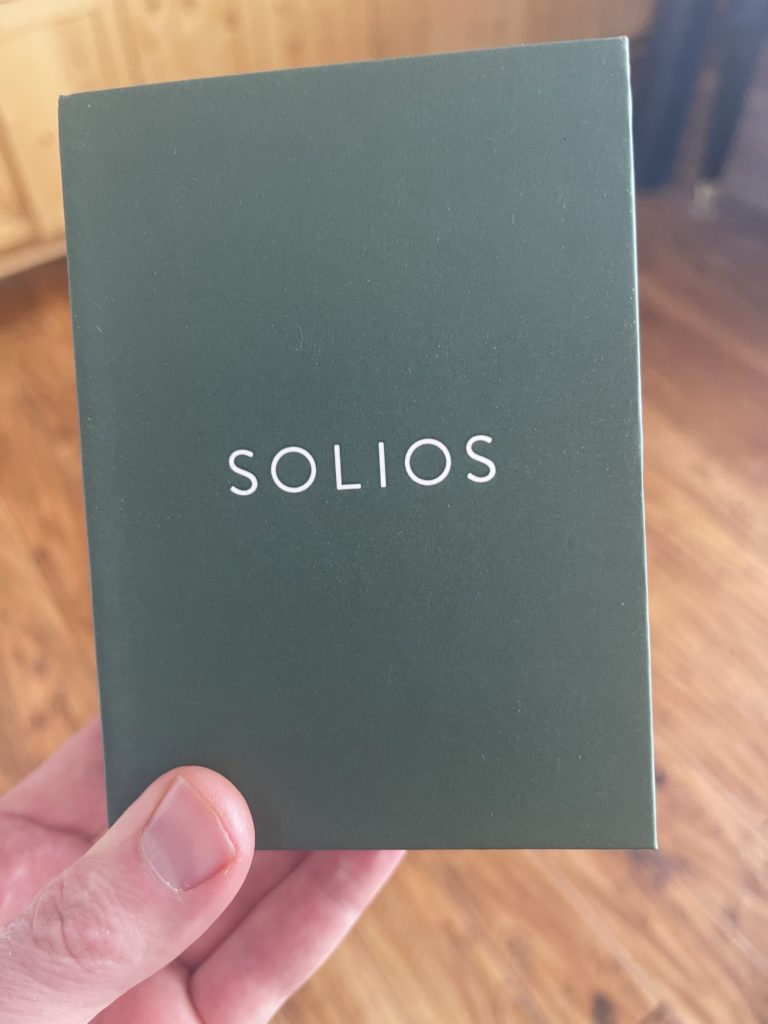
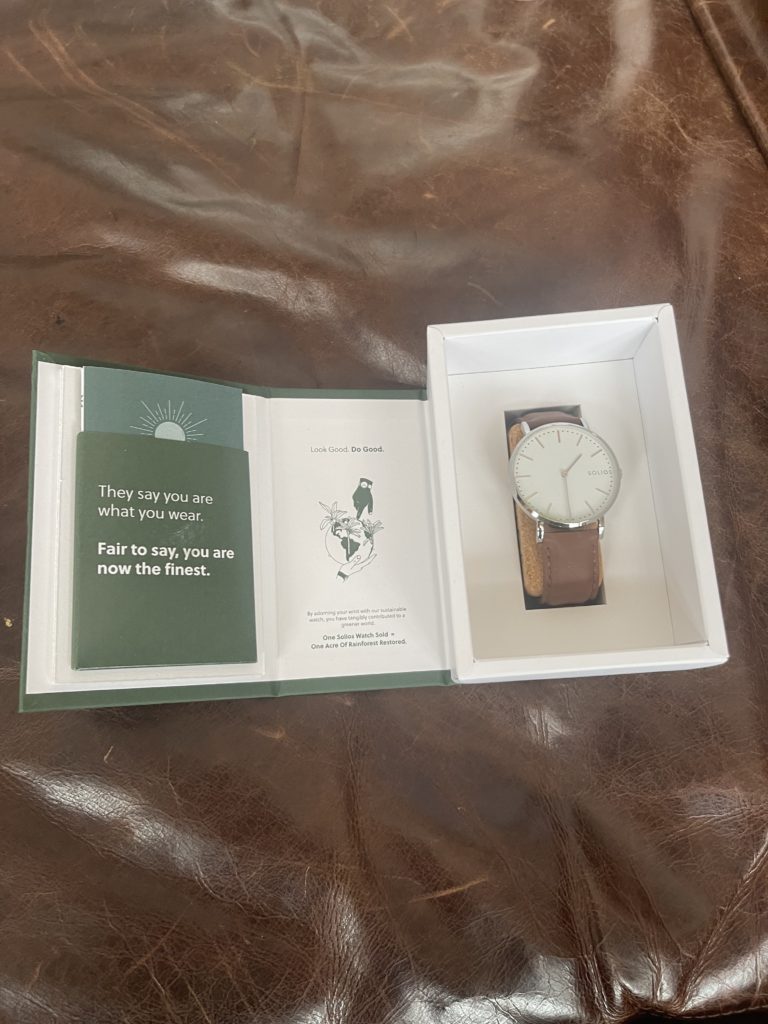
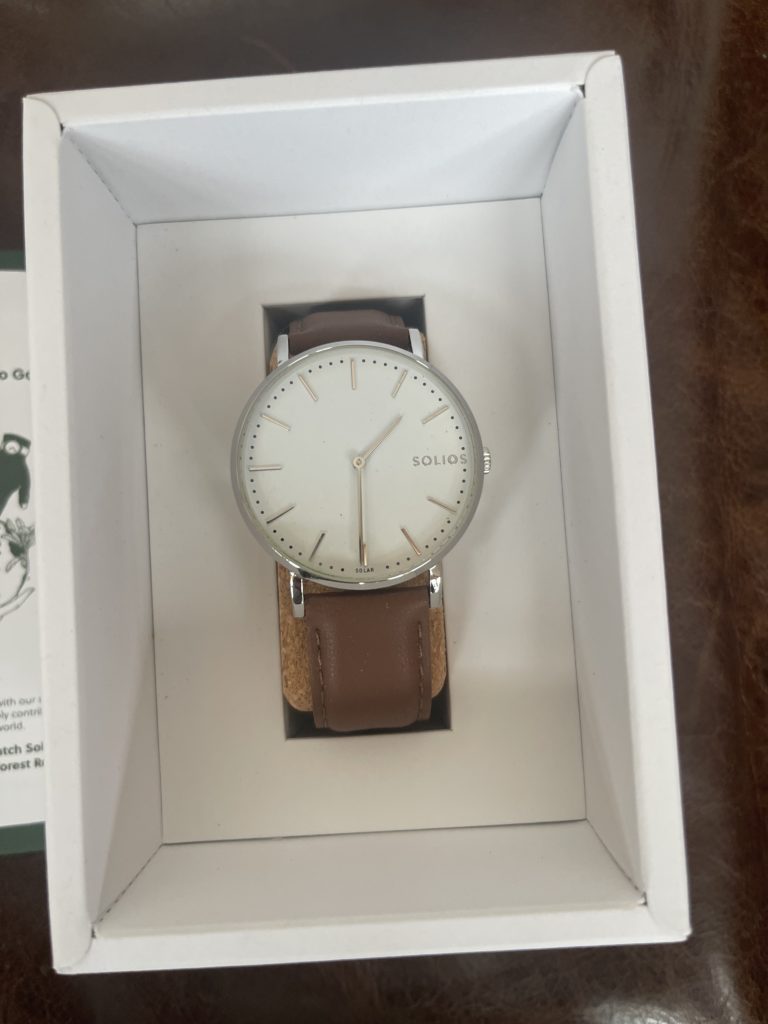

Tense
Highlights: A Canadian company making more sustainable watches using 100% reclaimed or recycled wood!
Another Canadian company, Tense makes watches using 100% recycled or reclaimed wood. These watches are powered by premium Rondo 6004D Swiss Movements or Japanese Miyota Watch Movements. Each watch is manufactured by hand in a workshop in Vancouver, British Columbia, Canada.
Tense Wooden Watches was founded in 1971 and the decades of craftsmanship are obvious in the collection. The watch dials are protected by scratch-resistant sapphire crystal and corrosion resistant surgical grade 316 stainless steel finished with PVD coating. Many of the watches have a waterproof rating of 5 ATM and straps made of vegan-friendly leather.
Tense is also a member of 1% for the Planet.

TRIWA [Staff tested]
Highlights: Innovative company making watches using metal sourced from confiscated illegal firearms and recycled ocean plastic.
TRIWA has been around since 2007 and stands for ‘Transforming the Industry of Watches.’ In general, TRIWA’s collection is more on the modern and sporty side, though there are also some classic timepieces on offer.
Several of TRIWA’s watches are made with humanium metal, a precious metal made from recycled illegal firearms sourced via the developmental organization IM Sweden. Since 2016, the Humanium Metal program has turned an estimated 12,000 illegal firearms into ‘peace metal,’ helping to address violence and reduce resource consumption simultaneously.
TRIWA donates 15% of every Humanium watch sold to IM to support their work with victims of armed violence in the areas from which the illegal firearms (the source of the metal) were confiscated. So far, the company has given back around $150,000 through their Time for Peace collection.
The company also has a collection made from recycled plastic fished out of the ocean, as well as classic polished silver, steel, and brass watch bodies. Unfortunately, TRIWA do use some animal leather in their watches, but this is at least sourced from an organic tannery in Sweden that uses a chrome-free vegetable tanning process. Alternatively, you can choose a strap made using recycled PET nylon.
The Humanium 39 Recycled Green watch, as an example, is made with Humanium metal, has a stainless steel buckle, recycled PET strap, quartz Miyota GL10 movement mechanism, and is water resistant to 10 ATM.
The company audits suppliers twice a year to check for fair labor practices and uses minimalist packaging made with recycled materials. A company spokesperson told me that TRIWA plans to have a full transparency report of its carbon footprint on the website by the end of June 2021.
Sadly, TRIWA don’t offer a lifetime guarantee for their watches. Instead, they offer a two-year warranty from date of purchase and only stock spare parts for products in the current collection. So, if your watch breaks after two years and they’ve switched up their collection, you may be out of luck. The warranty doesn’t cover the glass and if you’ve had the battery replaced by an unauthorized repair person your warranty is void.
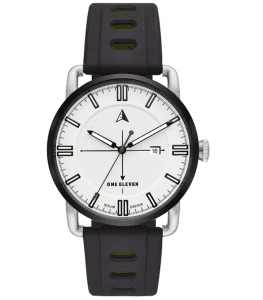
One Eleven Watches
Highlights: Exclusively solar powered watches with impressive water resistance made with bioplastics and recycled water bottles and stainless steel. Packaging is 100% recycled and non-toxic.
One Eleven exclusively make solar powered watches and offer a huge range of sustainable styles. The company uses bioplastic created from plant-based castor oil as well as rPET (recycled PET) straps made from recycled water bottles. The watch case is made with steel and the watches charge with both natural sunlight and artificial light thanks to a solar quartz mechanism that lasts 4-6 months when charged.
Most One Eleven watches have a 50 meter or 5 ATM level of water resistance (some, such as the Solar Powered Sustainable Field Watch offer 100 m of water resistance). A mineral crystal lens protects the dial and the Field Watch features raised numerals that glow in the dark.
All One Eleven packaging is made using 100% recycled paper and non-toxic inks. The company is a 1% for the Planet partner.
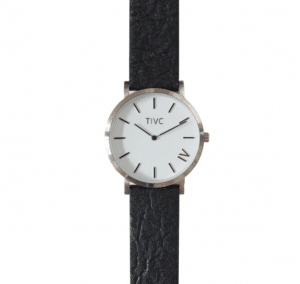
TIVC
Highlights: Mostly sustainable watches made with largely non-toxic materials by a company that donates 10% to charities. The company offsets shipping associated carbon emissions and uses 95% compostable, recycled, or recyclable packaging (the remaining 5% is reusable).
TIVC make eco-friendly vegan watches using a mixture of recycled synthetic eco suede and Pinatex, a vegan leather made using pineapple leaves. All watches have quick release straps, so you can easily switch up your style with TIVC’s interchangeable range of straps.
The TIVC watch bodies are made with stainless steel (most of which is recycled), and their dial is protected by anti-scratch sapphire crystal and good for up to 3 ATM. The watches are all free from Substances of Very High Concern (SVHC). This means no carcinogens, mutagens, or reproductive toxins or other substances on the candidate list of SVHC published by the European Chemicals Agency under REACH.
TIVC manufacture the watches in Hong Kong in an SA8000 certified factory and suppliers are required to adhere to a code of conduct and are subject to third party audits and regular checks from TIVC. The company offsets shipping associated carbon emissions and uses 95% compostable, recycled, or recyclable packaging.
TIVC is also a charitable partner, donating 10% of annual profits to animal welfare and environmental organizations.
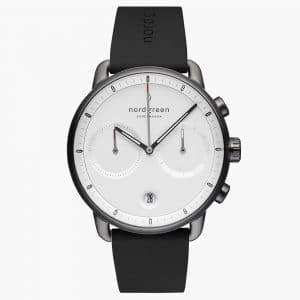
Nordgreen
Highlights: Mostly non-toxic and sustainable solar powered watches made with some recycled materials by a company engaged in some serious CSR activities to minimize and offset carbon emissions and cut waste. Some animal leather straps and polyurethane in vegan watch straps though.
Nordgreen is another Scandinavian watch company making more eco-friendly watches. The company uses conflict-free minerals and eschews phthalates, heavy metal stabilizers, and other common toxic materials found in watches (for the most part). Several watches are made with NATO straps that are certified by the Global Recycling Standard (GRS).
The vegan leather straps contains no persistent organic pollutants and no toxic by-products and has a non-woven polyester lining with a non-fibrous polyurethane binder. The vegan leather is GreenGuard certified and complies with RoHS.
All Nordgreen leather complies with the EU chemical legislation REACH and those that are Navy, White, or Grey originate from Leather Working Group tanneries. The leather is also all sourced from European raw cow hide and is a byproduct from the food industry (no cows are slaughtered for their skin only).
The company manufactures its watches in China but enforces European labor standards for fair working conditions. The manufacturer recaptures and reuses at least 99% of solvents involved in production. All of their batteries carry the CE mark guaranteeing high safety, health, and environmental protection requirements, as well as the Restriction of Hazardous Substances (RoHS) Directive.
Their Copenhagen office is carbon-neutral and they use FSC certified cardboard, recycled paper and plastic bottles for packaging. Nordgreen also has an initiative to re-use and re-sell used watches. They repair and polish returned used watches and have a dedicated refurbished store.
Nordgreen’s Giving Back Program sends donations to three NGOs in the Central African Republic, India, and Latin America, working to provide clean water, education, and support for preserving rainforests. The company tracks carbon emissions (to a degree) and in 2020 emitted 663 tons of CO2 via Last mile shipments, all of which was offset via the Burgos Wind Project.
The company uses LED lighting and Energy Star-rated appliances at their head office and use renewable energy. Nordgreen is working towards zero waste and recycle glass, aluminum, plastic, and paper waste while also encouraging staff to cycle to and from work and use public transit.
Nordgreen also has a plastic offset program, as of January 2021. In partnership with CleanHub, Nordgreen now offsets their plastic use for every watch sold (including the packaging) as well as for all full-time employees, equivalent to the world average of 7 kg per person/month. This amount is calculated every quarter, which is pretty innovative as offset programs go!
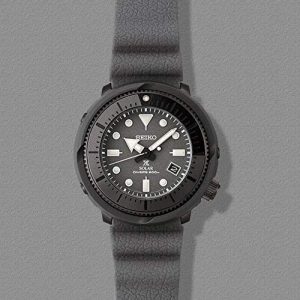
Seiko
Highlights: Dive certified solar powered watch made with stainless steel and/or silicone and recycled materials from a big brand name with an impressive CSR effort. Packaging info unavailable.
Seiko are a big name in watches and their Prospex Solar watches are worth a look if you’re keen on a solar-powered watch from a big brand name. The Seiko Prospex Chronograph SSC017, for example, is a 43 mm stainless steel watch with a fold-over clasp and double-push-button safety for a secure fit. It boasts luminous hands and markers, three chronograph subdials, and a Hardlex dial window for protection. The one-way rotating bezel has black and blue accents to surround the classic black dial.
Designed with serious divers and water sports people in mind, the Prospex has an ISO 6425 diving certification and can handle 200 meters of water resistance. You can also choose a special edition NATO strap made with silicone and recycled materials (view here). The solar charge will last up to six months and can be charged with sunlight or artificial light.
As a company, Seiko has taken considerable steps to address Corporate Social Responsibility (CSR), including looking at ways to reduce resource use right through from the design process to finished product. The company retrofits machinery to enable its continued use for new product lines, has switched to LED lighting and uses other measures to reduce energy use at offices and manufacturing facilities.
Seiko is also engaged in planting and stewardship of a forest in Japan along the Kujukuri coast through a Cooperative Forest Agreement, whereby Seiko planted 300 Japanese black pine trees to help rejuvenate the forest. Since 2015, Seiko has reduced CO2 emissions by an estimated 30,000 tons (to 2019). The company is also involved in various efforts to promote biodiversity.
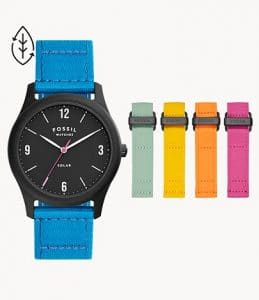
Fossil Solar
Highlights: Solar powered watch subsidiary of a much larger group of companies making an effort to be more sustainable. Fun, interchangeable, many colored straps made with bioplastic and recycled plastics. Fossil Solar aims to ship all products in fully recyclable or reusable packaging by 2025.
To try to reach the company’s environmental goals by 2025, Fossil has launched a line of solar-powered watches: Fossil Solar. Powered by sunlight, a fully charged watch battery will last around four months, making it easy to keep charged up even on gloomy days. For every watch purchased, Fossil plants a tree and the company is aiming to ship all products in fully recyclable or reusable packaging by 2025.
Fossil Solar watch cases are made from plastic, rather than stainless steel or other metal. This plastic is partially bioplastic made using castor oil. The straps are made with recycled PET from plastic bottles and Fossil Solar provides five different straps with each watch, giving you a fashionable array of colors to choose from every time you don your watch.
Fossil has also established the Fossil Foundation (a 501c3), where 1% of Fossil Solar pre-tax sales go to empower underserved youth worldwide.
As a whole, Fossil Group is looking to reduce water consumption for leather tanning by 45% by 2025 and to reduce greenhouse gas emissions by 30% and eliminate virgin plastics in the companies’ supply chains by 2030. The group is also introducing greater label transparency to highlight pro-planet products such as those that include a minimum of recycled content, have a well-recognized sustainability certification, and/or are made using processes that minimize waste going to landfill. Fossil Group is also looking to develop take-back programs across the globe to allow reuse and recycling of products and packaging.
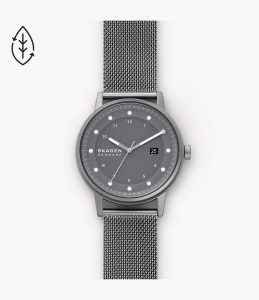
Skagen Henricksen
Highlights: Another big name in watches, venturing into solar powered watchmaking using some recycled materials for some models (but lacking transparency over all materials and sourcing). FSC certified paper for packaging (though unclear if other materials also used).
Skagen Henricksen is another big name in watches and, like Seiko, is making moves to be more sustainable. This means reducing the use of virgin plastics, sourcing leather from environmentally preferable tanneries and reducing water consumption for leather tanning by 45% by 2030, as well as using all FSC certified paper for packaging and designing in-store promotional materials to be recyclable.
In addition, Skagen Henricksen now offers a range of solar powered watches, including some made with recycled or more eco-friendly materials. These include:
Solar powered steel mesh watch (view here)
Solar powered brown eco leather watch (view here)
Solar three-hand date green recycled watch [Temporarily unavailable/possibly discontinued]
The latter is a solar powered watch with housing created from plant plastic (made with castor oil). It features a woven strap made with recycled bottles and has a very small carbon footprint. The material was created by a local Danish textile mill called Kvadrat known for eco-friendly, energy-saving processes. As a limited edition, there are only just over 400 in circulation. In fact, there are exactly 422, in honor of Earth Day (April 22)!
Unfortunately, it’s not at all clear what the company means by ‘eco leather’, which I suspect is just leather from a tannery using less toxic chemicals. I’ve reached out to ask and will update if/when I get a response.
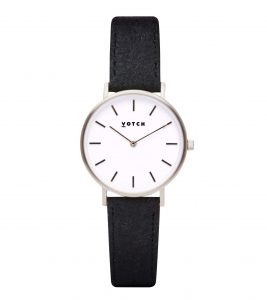
Votch
Highlights: UK company making vegan-friendly watches using some recycled and natural materials but also some plastic components. Votch uses recyclable, low-impact materials for packaging, but not exclusively recycled materials.
A UK watch brand, Votch is PETA approved as vegan-friendly and has a minimalist style with a simple color palette of greys/silver, rose gold, and black. Watches in the collection include classic round face designs and modern square designs.
Some of the watch straps are made with Pinatex, a by-product from the pineapple industry, AppleSkin, a by-product from the apple juice industry, and stainless steel. The Classic Collection features straps made of a cotton woven microfiber coated with PU. The Moment range (as well as the Aalto, Kindred and Lyka ranges) has straps made with Enviroleather, which consists of TPE, polyester and cotton.
All strap materials are free from PVC and phthalates and while not ideal include recycled and/or renewable materials. The straps pass CAL 01350, low VOC emissions, have no added antimicrobial chemicals, are PFC-Free, contain no flame retardants or bromine, and no heavy metals.
As for business ethics, Votch uses a factory in Shenzhen, China, to manufacture the watches and checks for fair wages and labor standards.
Votch uses recyclable, low-impact materials for packaging, but not exclusively recycled materials. The company donates 10% of profits to charity, typically those involved in animal welfare.
Bonus: Vestiaire Collective
Hailing from France, Vestiaire Collective isn’t a watchmaker but does offer an online thrift store to give timeless timepieces a second (or subsequent!) chance at life. Pre-owned luxury watches include those from brands like Chopard (see below), Bulgari, Gucci, Louis Vuitton, and Cartier. All of the watches are authenticated and checked to ensure good working order. Listings also note where the watch is located, meaning you can choose to shop local and reduce transport-related emissions.
The best of the rest – other watch companies to consider
Hopefully, there’s something in the list above that feels like a good fit for you, but if you’re still not tempted by a solar powered watch, you might want to consider a mechanical watch from one of the brands trying to do things a bit better than most. We highlight a few of these brands below, with a focus on lesser known watchmakers we think deserve more attention for their sustainability efforts.
There are, however, a few big brands also doing the work to turn around their environmental impact. The Swiss watch and jewelry manufacturer Chopard, for example, has spent years working with the Alliance for Responsible Mining to help mining communities obtain Fairmined Gold certification. This demonstrates a commitment to training, social support, and environmental stewardship that is generally lacking in this sector. Since 2018, Chopard has used 100 percent Fairmined gold for all its jewelry pieces and watches.
Baume is another brand to watch. Though new to the game (in 2018), Baume’s mandate is to make watches to order (reducing waste), use recycled materials, and avoid leather and other problematic animal products as well as precious metals and instead use natural materials such as cork, cotton, and linen, as well as some recycle PET for watch straps.
A 2018 report by the World Wildlife Federation Switzerland assessed the sustainability of 15 of the major watch brands and assigned scores. The best performers were brands from the Richemont Group (Cartier, IWC, Jaeger-LeCoultre, Piaget and Vacheron Constantin). These were the only brands to demonstrate any significant attempts to monitor and improve their sustainability efforts, though Chopard did demonstrate a commitment to improving one aspect of the company’s supply chain.
The WWF report placed most emphasis on raw material sourcing, given that this is connected to “deforestation, soil degradation, water contamination, the use of hazardous substances and social injustices.” Most companies failed spectacularly on this front, with no transparency and outright secrecy on sourcing practices. IWC was that only company to publish their raw materials data. Several companies relied on the Responsible Jewellery Council certification, but this doesn’t include a third-party assessment of responsible sourcing, offering little reassurance to consumers.
The trouble with watches
Watches are made using a range of precious metals and other materials and the supply chain for these goods can involve poor labor conditions and pay, significant negative environmental impacts from mining, and shoddy products that don’t last long and are destined shortly for landfill as they’re very difficult, if not currently impossible, to recycle.
Some watch manufacturers try to greenwash their products’ environmental impact by creating limited editions where a portion of profit goes to a green charity. Or the company may proudly proclaim having switched to eco-friendly packaging, or to carbon offsetting some portion of company emissions. These efforts are a step in the right direction, but they do little to address the problems associated with the production (and ongoing operation) of the watches themselves.